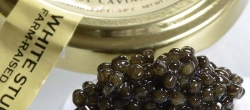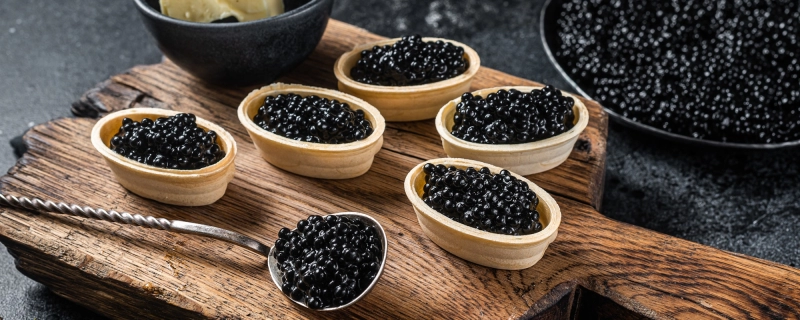Category: Fish and Seafood
Sturgeon Caviar: Taste, Uses, and Benefits
Sturgeon caviar is one of the most renowned and expensive types of caviar, sourced from sturgeon fish. It has a delicate, slightly salty taste, a rich creamy texture, and is celebrated worldwide as a luxurious delicacy. This type of caviar is prized for its rich and deep flavor, as well as its nutritional benefits.
What does Sturgeon Caviar taste like?
Sturgeon caviar has a rich, creamy, and mildly salty taste that develops with each bite. Its flavor is often described as smooth, nutty, and with subtle hints of the sea. This distinctive flavor profile is due to the natural oils and fats in the caviar, which give it a velvety texture and a complex taste.
Flavor and Texture Details
- Flavor: Delicate, creamy, with nutty and slightly briny notes.
- Aroma: Subtle, oceanic, without a strong fishy smell.
- Texture: Smooth and firm; the eggs gently pop, releasing a rich, buttery flavor on the palate.

How Can Sturgeon Caviar Be Used in Cooking?
Sturgeon caviar is often used as a gourmet garnish or ingredient. Here are a few common ways to serve it:
- Traditional Serving: Often enjoyed on blinis or toast with a small dollop of sour cream.
- With Appetizers: Served on small slices of bread with butter or cream cheese.
- In Salads and Soups: Adds a touch of luxury as a topping for salads or creamy soups.
- With Alcohol: Typically paired with champagne or chilled vodka to complement its taste.
What Are the Health Benefits of Sturgeon Caviar?
Sturgeon caviar isn’t just tasty—it’s packed with nutrients! Here are some of its health benefits:
- High-Quality Protein: Rich in easily digestible protein, helping maintain energy and muscle mass.
- Omega-3 Fatty Acids: Promotes heart health, reduces cholesterol, and supports brain function.
- Vitamins A, D, and E: Boosts immunity, improves skin health, and supports bone strength.
Are There Any Precautions When Consuming Sturgeon Caviar?
Yes, while sturgeon caviar is beneficial, there are a few things to consider:
- Salt Content: Caviar contains salt, so people with high blood pressure or kidney issues should consume it in moderation.
- Caloric Content: Caviar is calorie-dense due to its fat content, so moderate portions are best.
- Allergies: Though rare, some individuals may experience allergic reactions to seafood, so caution is advised.

How to Choose Quality Sturgeon Caviar?
Selecting caviar can be challenging, so here’s what to look for:
- Color and Appearance: Quality sturgeon caviar is glossy and ranges from dark gray to black. The eggs should be firm and uniform.
- Aroma: Fresh caviar has a subtle oceanic aroma without any strong odor.
- Source: It’s best to choose caviar from reputable suppliers, especially if labeled as farm-raised sturgeon.
How to Properly Store Caviar?
To keep caviar fresh, follow these storage tips:
- Temperature: Store caviar at -2 to +4°C (28 to 39°F), typically on the top shelf of the refrigerator.
- Shelf Life: An opened jar of caviar lasts up to 3–4 days, though it’s best consumed soon after opening.
- Airtight Seal: Always keep the jar tightly sealed to prevent air from spoiling the flavor and texture.
Fun Facts About Sturgeon Caviar
- Origins: Sturgeon caviar is one of the oldest known delicacies, mentioned in ancient Greek and Roman history.
- Price Range: Due to the long growth period of sturgeon and its rarity, sturgeon caviar is among the world’s most expensive foods.
- Color Variety: Depending on the sturgeon’s age, caviar can range from silvery-gray to deep black.